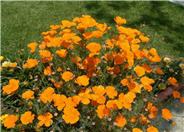
Common name:California Poppy, Golden Poppy
Botanical name:Eschscholzia californica
This small annual (sometimes acts as a perennial) plant will grow to less than 1' tall and has light, small blue green leaves with gold and orange flowers that bloom in spring and summer.
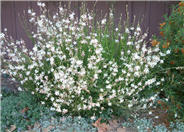
Common name:White Gaura
Botanical name:Gaura lindheimeri
White Gaura is a profusely flowering perennial for all zones; it grows 2'-4' high. It has pink buds that open to showy white flowers in spring and fall. It needs full sun and is drought tolerant.
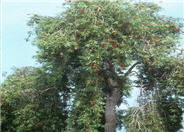
Common name:Weeping Bottlebrush
Botanical name:Callistemon viminalis
The Weeping Bottlebrush is a small tree with spreading branches that grows to 15'-25' in height. It produces narrow clusters of dark red flowers, and performs best with average to occasional summer watering.
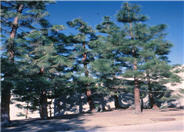
Common name:Canary Island Pine
Botanical name:Pinus canariensis
This graceful, slender-growing pine has a pyramidal form to about 70'. ITs needles are long and drooping inb bundles of 3. The foliage is a blue-green color, maturing to a dark green shade. Pines are highly combustible plants.
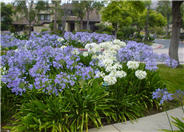
Common name:Lily of the Nile
Botanical name:Agapanthus hybrids
This evergreen ground cover/shrub will grow about 3' tall and has large green leaves with blue flowers (there is a white variety and dwarf varieties) that bloom in spring and summer. It will grow in all soils but prefers loam soil.
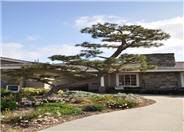
Common name:Japanese Black Pine
Botanical name:Pinus thunbergii
This variety of Pine is both rigid and twisted, with needles of 3"-4". It has an irregular shape, and the short, contorted branches produce a canopy shaped tree. The buds are white, and the cones are egg -shaped and without prickles. Pines are highly combustible plants.
| Designer: Laura Dalton | Gold Garden Right View |
Photographer: GardenSoft |
Soils and Compost:
Incorporate compost 6" into your soil to retain water, reduce compaction, feed earthworms, and provide valuable nutrients to your plants.
Water Saving Tip:
Check your irrigation system for breaks, leaks and problems once a month.
Integrated Pest Management:
Attract, or buy beneficial insects such as ladybugs and lacewings to control pest outbreaks in your garden.
